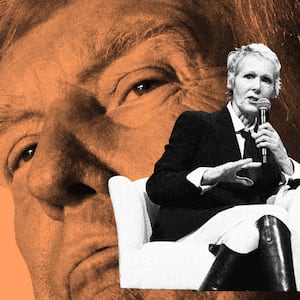Former President Donald Trump’s rape trial in New York got off to a quick start on Tuesday, as both sides quickly picked a jury that will decide whether they believe Trump raped journalist E. Jean Carroll in the mid-1990s.
While the jurors are actually ruling on two civil charges—one for defamation, and one for battery—the judge was clear Tuesday morning about what the nine New Yorkers were really deciding.
“It is the job of the jury to decide what, if anything, happened,” U.S. District Judge Lewis Kaplan said Tuesday.
If found liable, Trump faces the possibility of paying serious money for allegedly raping former journalist Carroll inside the changing room of a New York City luxury department store almost three decades ago.
The initial phase of the trial got off to an odd start that highlighted the strange nature of having a divisive and cantankerous former president like Trump facing such seriously damaging accusations.
In a thinly veiled statement that seemed clearly aimed at Trump—who incited the Jan. 6 attack on the U.S. Capitol and has since used his immense platform to regularly attack prosecutors and judges—Judge Kaplan warned lawyers in court against “conduct that has the potential for civil unrest.”
Kaplan cited “the safety and privacy of jurors in this case,” describing his caution as a mere “request.” But when the potential jury pool entered his courtroom, he promised them that their identities would remain secret “for your protection,” granting them total anonymity—a rare step usually reserved for criminal cases involving mob bosses and notorious narcotraffickers.
“God willing, nobody will ever know your names,” he told them all, noting that not even he would know who they are.
The judge also noted that, unlike most trials where jurors simply show up in court with the rest of the public, U.S. Marshals in this case would meet jurors away from the courthouse and drive them into and out of an underground garage every day.
An initial batch of 48 prospective jurors was quickly whittled down to 35, with the judge promptly running through 82 questions submitted by lawyers on both sides. He excused a New Yorker who was unvaccinated, another who donated to the political campaigns of Presidents Biden and Obama, and others who openly admitted they couldn’t judge the case fairly.
Although Kaplan in the morning cautioned that it might be difficult to find nine willing and unbiased jurors to judge the facts at trial, at 1:14 p.m. he announced that lawyers had selected a jury and broke for lunch. Lawyers for Carroll and the former president are expected to present opening statements this afternoon.
Given Trump’s divisive nature—and the vastly different way he’s covered by American journalists—the lawyers in this case were adamant about knowing where prospective jurors get their news. In court papers filed in recent weeks, lawyers informed the judge that they wanted to identify anyone who’d heard about Trump’s mounting legal troubles—including his recent criminal indictment for faking business records—and potential users of his social media platform, Truth Social.
On Tuesday, as each person discussed their personal details, the judge had to repeatedly ask them what they read and watched to stay up-to-date. While all of them claimed to be registered to vote and most acknowledged voting in the last two presidential elections (both of which had Trump on the ballot), the vast majority said they get their news from “Google” or “random” things on social media.
The nine-person jury consists of:
- A 37-year-old father who works at the New York Public Library, lives in Westchester County north of New York City, and said he’s informed by “Google, anything on the internet”
- A 64-year-old physical therapist mom in the Bronx who watches CNN
- A 26-year-old retail worker in Manhattan who said “social media is my news outlet”
- A 46-year-old former janitor who said he doesn’t “really watch news or listen to anything”
- A 55-year-old mother who works in a health care facility’s collections department and said she’ll “watch anything”
- A 60-year-old father in faraway Rockland County in Upstate New York, who studied computer coding, now works in a hospital, and likes to “flip channels”
- A 62-year-old Spanish speaking mom in the Bronx who watches CNN
- A 31-year-old security guard in the Bronx who claimed to “tend to avoid news,” but added that he’s informed by “mainly podcasts,” like the one hosted by right-wing provocateur Tim Pool
Pool is a podcaster who portrays himself as a disaffected leftist, one who has gained a huge popularity in recent years by spreading far-right talking points—leading to a personal invitation to the Trump White House in 2019.
He’s notorious for misconstruing news with a right-wing slant, has been deemed a “super spreader” of misinformation, and has had his fair share of debacles.
In 2021, Pool allegedly held a cat hostage in a business negotiation. When he tried to rehabilitate Kanye West’s image amid the rapper’s wildly anti-Semitic claims late last year, the musician stormed out of the interview when Pool lightly defended Jews.







